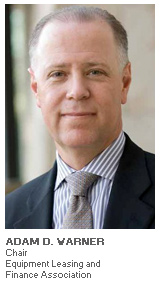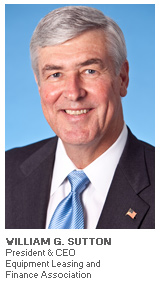
As we approach the start of the fourth quarter, Equipment Finance Advisor weighs in with the Adam Warner and William Sutton, the ELFA's chairman and president, to gain their perspectives on the progress and any setbacks experienced in the industry thus far in 2014. Both Warner and Sutton speak candidly with regard to topics ranging from tax reform to the actions taken to recruit new talent into the industry. In closing, the industry leaders offer their thoughts on the passing of Mike Fleming and Fleming's significant contribution to the equipment leasing and finance industry.
In spite of the concerns -- whether gridlock in Washington to less than stellar economic growth -- both men maintain that on the whole, the industry's constituents remain positive and continue to look for innovative ways to expand their businesses.
Equipment Finance Advisor: Now that you are roughly ten months into your role as chairman of the Equipment Leasing and Finance Association, has the vision and/or strategy to move the equipment finance industry forward changed in any way? The association has been focused on impacting the course of FASB lease accounting, tax reform and the recruitment of young talent into the industry. Have those initiatives shifted in light of the somewhat anemic growth in equipment investment thus far in 2014? Also, feel free to speak in terms of what got accomplished on those priorities.
Adam Warner: While our industry still faces many of the same issues now as it did ten months ago, we’ve made some distinct progress on many fronts. The ELFA has continued to work closely with the IASB and the FASB on the proposed new lease accounting standards. We have worked diligently with the standard setters to explain what is important to both lessors and lessees from an accounting presentation perspective and we are pleased that the FASB is more focused on doing the right thing for the U.S. industry rather than charging head with global convergence at any cost. There is still work to be done, but rest assured that the ELFA is staying in front of this issue.

On the policy front, the possibility of comprehensive tax reform seems significantly less likely now than it did a year ago due to gridlock in Washington. The ELFA has a strong history of working closely with legislators to educate them on issues that are important to us as an industry and to capital formation in general, and we continue to be very active on that front. This has served us very well historically and will continue to do so in the future.
Going into my chairmanship, I was committed to focus on emerging talent as one of my top priorities, and I’m pleased to report some significant traction in this area over the past ten months. The ELFA board of directors created an emerging talent subcommittee, which is chaired by Jud Snyder of BMO Harris. Earlier this year, the subcommittee created an advisory group made up of emerging leaders from companies throughout the industry. The group met for the first time in Washington, D.C. in June to talk about how to attract and retain younger and emerging talent to our industry.
The goal is to establish a permanent advisory group that becomes part of the fabric of the ELFA going forward and has a real impact on the way the ELFA thinks about its members and the industry. I expect to see the board subcommittee recommend this advisory group to the full board this October and I feel great about the direction in which we are headed when it comes to finding and retaining the next generation of our industry’s leaders.

William Sutton: The association’s 2014 budget and work plan, from advocacy to outreach to education, are currently on plan and we’re projecting a very successful 2014. The Equipment Leasing & Finance Foundation’s Economic Outlook report projects 2.6% growth in investment in software and equipment, and a stronger second half of the year after a weather-impacted first quarter. Our members are generally optimistic, but are still experiencing a replacement market—not one of expansion.
Equipment Finance Advisor: The industry’s confidence level appears to waiver. Since January of this year, the MCI-EFI has been something of a rollercoaster – rising, leveling off and in August, dipping below 60. Please provide your insights as to what you think is behind this lackluster performance.
Warner: I actually think industry confidence is surprisingly strong in light of our overall slow-growth, tepid economy. Confidence is an emotion and it fluctuates from day to day and is easily impacted by things like federal policy, the political environment, jobs reports, breaking news and the way people feel about the economy in general. We are also operating in a world that is more geopolitically unstable than it has been perhaps in my lifetime, which I believe is also a drag on the confidence index.
What I think is really more telling is that we have entrepreneurs and leaders in our industry finding innovative ways to grow despite the slow economy. In my opinion, developing new products and services to help meet the needs of an evolving marketplace is a true sign of resilience and optimism for the future.
Continued on Page 2...